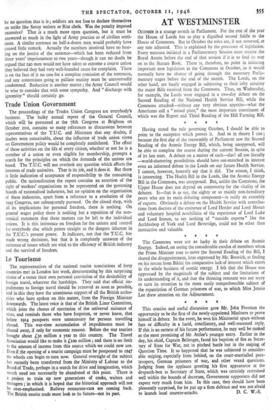AT WESTMINSTER
OCTOBER is a strange month in Parliament. For the rest of the year the House of Lords has to play a dignified second fiddle to the House of Commons. But in October the roles are, if not reversed, at any rate adjusted. This is explained by the processes of legislation. Every measure initiated in a Parliamentary Session must receive the Royal Assent before the end of that session if it is to find its way on to the Statute Book. There is, therefore, no point in initiating important new legislation in the Commons in October, as it would normally have no chance of going through the necessary Parlia- mentary stages before the end of the month. The Lords, on the other hand, are busily engaged in subjecting to their :ofty scrutiny the major Bills received from the Commons. Thus, on Wednesday, for example, the Lords were engaged in a two-day debate on the Second Reading of the National Health Service Bill, while the Commons attacked—without any very obvious appetite—what the Americans call a "mixed plate," the most important constituent of which was the Report and Third Reading of the Hill Farming Bill.
* * * * Having stated the rule governing October, I should be able to point to the exception which proves it. And so in theory I can ; because the first day of the reassembly of Parliament saw the Second Reading of the Atomic Energy Bill, which, being unopposed, will be able to complete the course during the current Session, in spite of its late start. A debate on a matter of such—alas! all too literally —world-shattering possibilities should have out-matched in interest even an informed debate in the Lords on our future Health Service. I cannot, however, honestly say that it did. The reason, I think, is interesting. The Health Bill in the Lords, like the Atomic Energy Bill in the Commons, was unopposed. But, unlike the Commons, the Upper House does not depend on controversy for the vitality of its debates. It—that is to say, the eighty or so mainly non-hereditary peers who are its main debating component—is really an assembly of experts. Obviously a debate on the Health Service with contribu- tions from doctors of the eminence of Lord Horder and Lord Moran and voluntary hospital notabilities of the experience of Lord Luke and Lord Inman, to say nothing of "outside experts" like the Archbishop of York and Lord Beveridge, could not be other than instructive and valuable.
* *
The Commons were not so lucky in their debate on Atomic Energy. Indeed, on seeing the considerable exodus of members when the Prime Minister rose to move the Second Reading of the Bill, I shared the disappointment, later expressed by Mr. Beswick, at finding on his return from Bikini the comparative lack of interest which exists in the whole business of atomic energy. I felt that the House was oppressed by the magnitude of the subject and the limitations of its understanding of it, and that the thinning remnant was not sorry to turn its attention to the more easily comprehensible subject of the repatriation of German prisoners of war, to which Miss Jennie Lee drew attention on the Adjournment.
* * * *
This concise and useful discussion gave Mr. John Freeman the opportunity to be the first of the newly-appointed Ministers to prove himself in debate. In the event, he won his Ministerial spurs without fuss or difficulty in a lucid, conciliatory, and well-reasoned reply. If this is an earnest of his future performance, he may well be ranked as the most promising of Mr. Attlee's younger entry. Earlier in the day, his chief, Captain Bellenger, faced his baptism of fire as Secre- tary of State for War, not in pitched battle but in the sniping of Question Time. It so happened that he was subjected to consider- able sniping, especially from behind, on the court-martialled para- troopers, German prisoners of war, and other vexed questions. Judging from the applause greeting his first appearance at the despatch-box as Secretary of State, which was certainly restrained well within the bounds of decorum, Government supporters did not expect very much from him. In this case, they should have been pleasantly surprised, for he put up a firm defence and was not afraid






























 Previous page
Previous page